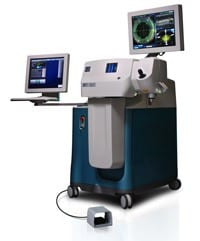Combining Laser Eye Surgery with New Lenses
As you age your lens cannot keep up with your vision. The first thing you experience with an aging or dysfunctional lens is the loss of accommodation or near vision. This results in the annoying reading glasses or bifocals. As you get older this gets worse and even the clarity of vision decreases (cataract formation). Until recently there was no real surgical solution to address both distance and near vision. Laser eye surgery or LASIK fully corrects distance vision. As good as this procedure is, it does, not however address near vision nor reading. LaserOptix™ is the fusion of two new recent advances in eye surgery: lens surgery utilizing an advanced femtosecond laser (LensX) and implantation of a trifocal intraocular lens (PanOptix).
Click on the video to learn how laser cataract surgery works
LaserOptix™Patient Testimonial
LenSx laser
 The LenSx laser provides patients with computer-controlled precision for their eye surgery. It automates some of the most challenging steps of refractive lens surgery. This femtosecond laser replaces the traditional hand-held blade to optimize all incisions for enhanced, reproducible surgical results.
The LenSx laser provides patients with computer-controlled precision for their eye surgery. It automates some of the most challenging steps of refractive lens surgery. This femtosecond laser replaces the traditional hand-held blade to optimize all incisions for enhanced, reproducible surgical results.
In traditional non-laser basic lens surgery, the surgeon makes incisions and removes the dysfunctional lens using surgical instruments and blades. However, during laser lens surgery, several of the most critical steps of the surgical process are performed using an image-guided femtosecond laser. This adds a layer of safety and more reproducible outcomes.
Panoptix lens
 Once your natural lens is removed it has to be replaced by an artificial intraocular lens (IOL). These lenses are available with optics that provide patients with a wide range of visual clarity and focusing capability. Our goal is to give you the best overall quality of postoperative vision with the lens that is best suited for your visual needs.
Once your natural lens is removed it has to be replaced by an artificial intraocular lens (IOL). These lenses are available with optics that provide patients with a wide range of visual clarity and focusing capability. Our goal is to give you the best overall quality of postoperative vision with the lens that is best suited for your visual needs.
Basic monofocal IOLs provide clear vision with the use of eyeglasses. Most individuals with basic lens implants will need bifocals and/or reading glasses to see optimally far and near. We use basic monofocal IOLs with our basic cataract surgery package.
The PanOptix lens is designed to provide the widest range of vision with minimal, if any, need for glasses or contact lenses to see clearly far or near.
This is the first trifocal lens approved by the U.S. FDA. This lens gives you the best potential for you to see distance, intermediate, and near objects. Most of our patients do not use glasses unless they are reading very fine print. This lens also corrects for any astigmatism that you may have. Reducing astigmatism will further enhance visual clarity. This is the preferred lens for the LaserOptix™ procedure.
Clear Lens Exchange
Clear lens exchange works the same as cataract surgery, except that our ophthalmologist removes a clear, healthy eye lens instead of one clouded from a cataract. This approach is often an excellent option for those looking to get rid of prescription eyeglasses, contact lenses and reading glasses. The LaserOptix™ procedure with PanOptix intraocular lens implants offers better vision at all focal points.
Candidates for clear lens exchange are typically over the age of 40, experience frustrations with reading glasses and may have required corrective eyewear since childhood. Clear lens exchange can improve these vision concerns for adults with presbyopia, but it may also be a good choice for those who don’t qualify for LASIK or PRK due to high nearsightedness or farsightedness.
The clear lens exchange procedure carries fewer post-operative risks than laser vision correction. It does not interfere with the epithelium (surface layer of the cornea) like LASIK, which can be troublesome for people with thin corneas, dry eye disease or other concerns. Recovery after clear lens exchange is often quick, allowing you to return to work after a few days, though you will need to follow eye care instructions while your eyes fully heal over the following months.
Another enticing benefit of clear lens exchange with LaserOptix™ is cataract prevention. The procedure removes the eye’s natural lens, thus eliminating the possibility of cataract formation in the future. With most adults over 65 developing cataracts, you can avoid vision loss and future cataract surgery.
Take our LaserOptix™ Quiz
Laser Lens Eye Surgery FAQs
What are the Benefits of LaserOptix™?
 LaserOptix™ marries two technologies to address refractive errors and eliminate cataracts or cataract risk. This procedure is often an excellent alternative for people who do not qualify for LASIK due to dry eye disease, thin corneas, age or other factors. The LenSx system removes human error from the equation. A femtosecond laser is used instead of the traditional handheld blade (microkeratome) technique for cataract surgery and clear lens exchange, offering precise, predictable incisions and results. The PanOptix® trifocal IOL used for LaserOptix™ is a one-of-a-kind artificial lens that provides enhanced results for clear vision at all three focal points.
LaserOptix™ marries two technologies to address refractive errors and eliminate cataracts or cataract risk. This procedure is often an excellent alternative for people who do not qualify for LASIK due to dry eye disease, thin corneas, age or other factors. The LenSx system removes human error from the equation. A femtosecond laser is used instead of the traditional handheld blade (microkeratome) technique for cataract surgery and clear lens exchange, offering precise, predictable incisions and results. The PanOptix® trifocal IOL used for LaserOptix™ is a one-of-a-kind artificial lens that provides enhanced results for clear vision at all three focal points.
LaserOptix™ is a vision solution for those who don’t qualify for LASIK and wish to eliminate corrective eyewear or cataract patients who want better vision after the clouded lens is removed.
What are Refractive Errors?
Vision is an extraordinary sense involving many moving parts. The dome-shaped cornea at the front of your eye works with the natural lens to capture light rays traveling through the eye, similar to a camera taking a photograph. The optic nerve then sends that data to your brain to transform the light into images. However, many people have refractive errors in which a misshapen cornea or a stiffened eye lens disrupts the light rays, causing blurry vision.
Nearsightedness, farsightedness and astigmatism are refractive errors caused by the corneal shape. Presbyopia is a different refractive error that happens when the natural eye lens hardens and loses its ability to accommodate changing focal distances. Most everyone will develop presbyopia as they get older, which is why reading glasses are common after age 40.
While LASIK, Zeiss SMILE and PRK can correct issues with an abnormally shaped cornea, these laser eye surgeries can’t address issues with the lens inside the eye. PanOptix® trifocal IOL is the only artificial lens implant that’s FDA-approved to provide clear vision at three focal points, improving all forms of refractive error.
Why is PanOptix® the Preferred Intraocular Lens Implant?
 AcrySof® IQ PanOptix® Trifocal IOL is the only trifocal lens implant approved by the U.S. Food and Drug Administration (FDA). The artificial lens can reduce your dependence on reading glasses or help you get rid of them altogether. While multifocal and monofocal IOLs can improve nearsightedness and farsightedness, you will still need readers to see fine print or discern a text message on your smartphone. PanOptix® is the only IOL that can effectively treat presbyopia on top of other refractive errors.
AcrySof® IQ PanOptix® Trifocal IOL is the only trifocal lens implant approved by the U.S. Food and Drug Administration (FDA). The artificial lens can reduce your dependence on reading glasses or help you get rid of them altogether. While multifocal and monofocal IOLs can improve nearsightedness and farsightedness, you will still need readers to see fine print or discern a text message on your smartphone. PanOptix® is the only IOL that can effectively treat presbyopia on top of other refractive errors.
These trifocal lenses are created with foldable acrylic and 26 diffractive rings to enhance near, intermediate and distance vision, with toric versions available for astigmatism. PanOptix® lenses are coated with ultraviolet and blue light filtering material to protect your eyes during screen use and outdoors. They provide better image quality with enhanced close-by and middle vision and allow easier reading without reading glasses when compared to other options.
LaserOptix™ with the PanOptix® IOL eliminates the need for LASIK because the lens power is uniquely suited to your vision needs, and the LenSx computer-guided system ensures precise, accurate placement for the best-corrected vision. Dr. Ashraf and our experienced team at The Atlanta Vision Institute can determine if LaserOptix™ is right for you so you can enjoy clear vision while seamlessly switching from applying makeup or shaving to working on a computer to gazing out your window.

Please Take Our LASIK or Cataract Surgery Quiz
Take our vision quiz to find out if you qualify for LASIK or cataract surgery!



